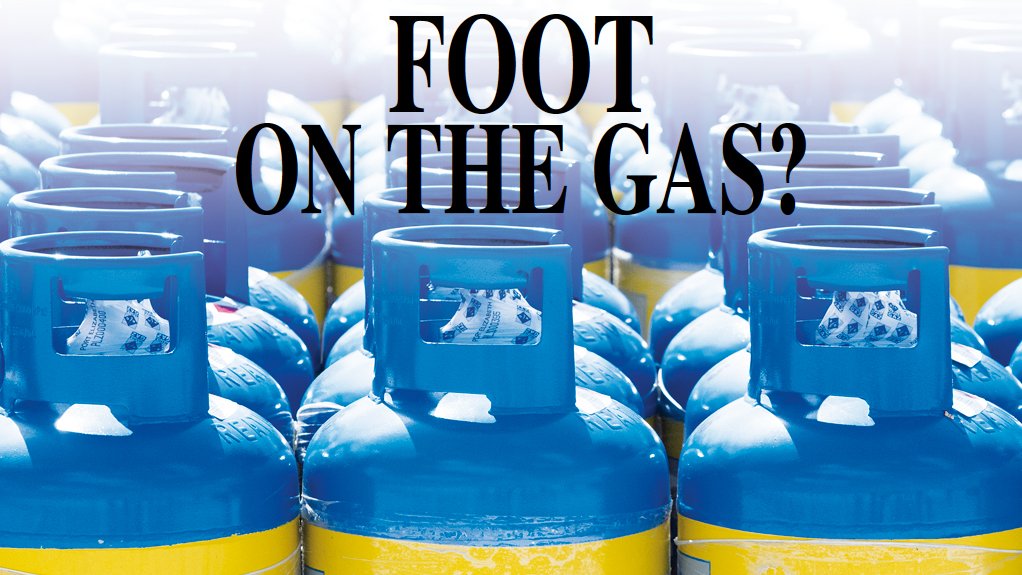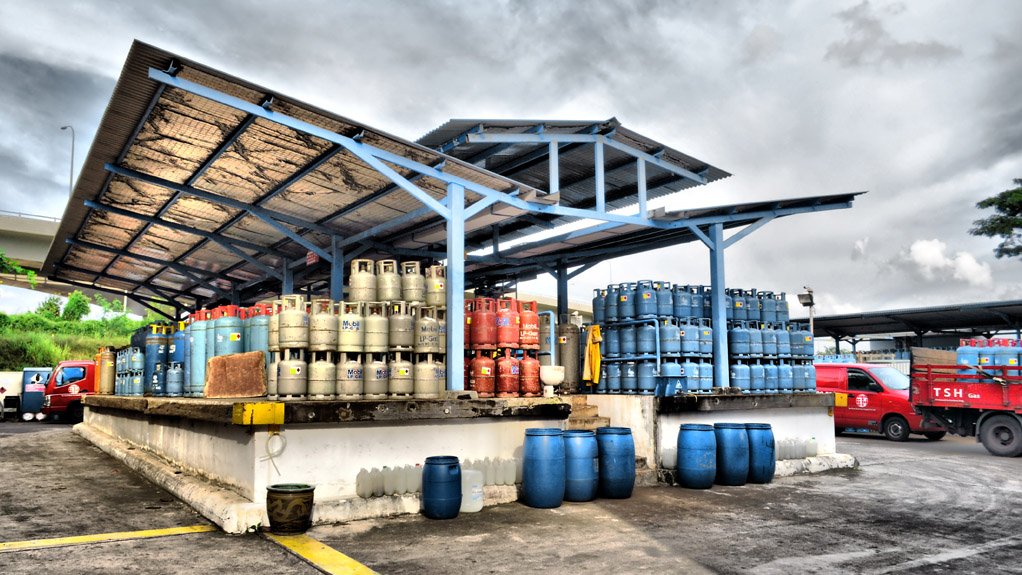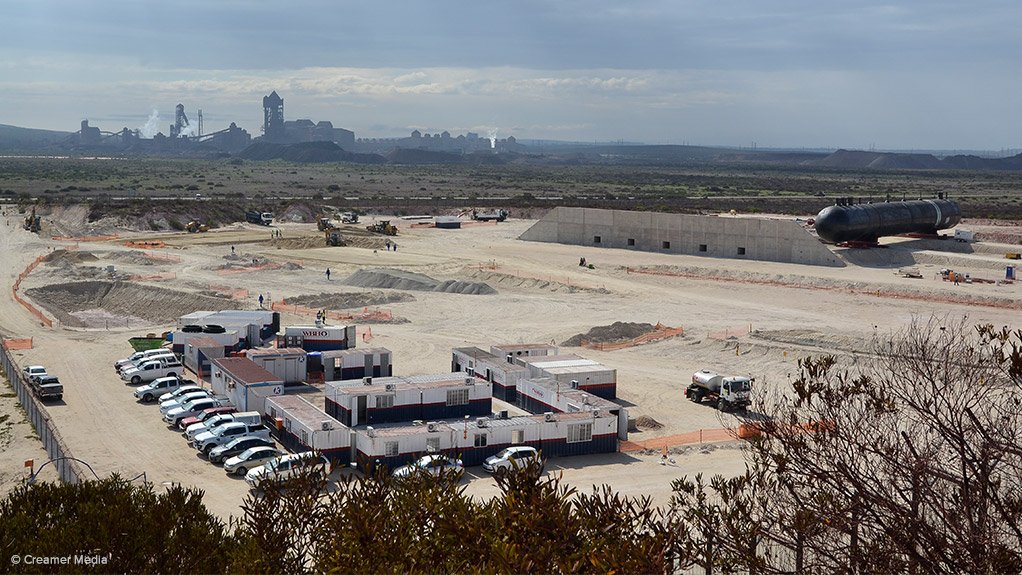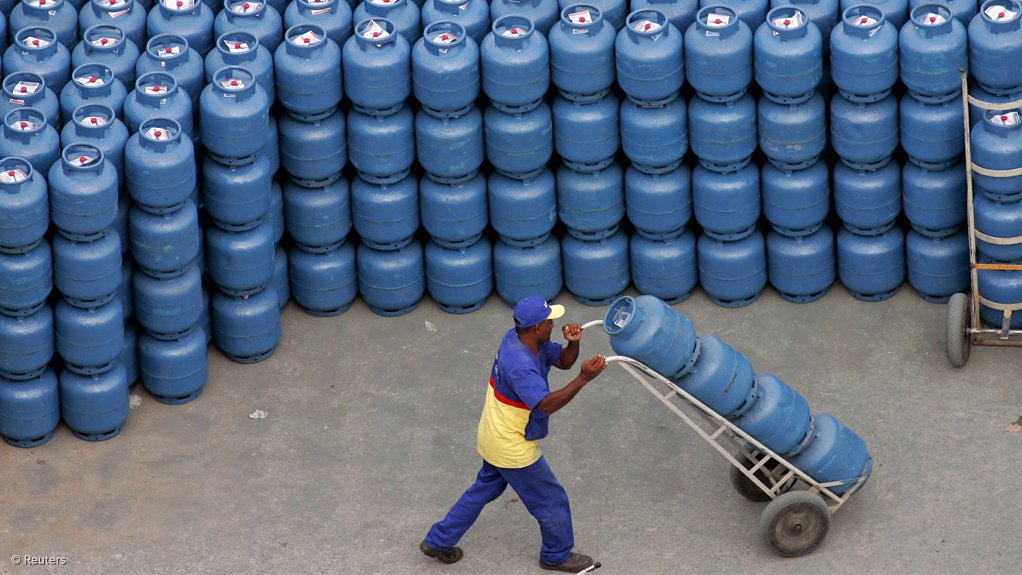Still much uncertainty as LPG stakeholders grapple with market inquiry findings





MARKET STRUCTURE Five refineries produce 80% of the of yearly supply of 350 000 t LPG in South Africa while four wholesalers account for more than 90% of the market
INFRASTRUCTURE IMPERATIVE The LPG market inquiry recommendations suggest greater alignment of adjudication processes to avoid delays in the construction of import and storage facilities
Photo by Dylan Slater
CYLINDER CONUNDRUMS The Competition Commission found evidence of collusion in terms of cylinder deposit fees and suggests that the cylinder exchange practice creates barriers to market entry
Photo by Reuters
In the findings and recommendations of the first-ever market inquiry into the local liquefied petroleum gas (LPG) industry, the Competition Commission urges public and private organisations to improve performance in the sector, yet much uncertainty remains in the wake of the report’s publication.
The commission initiated the market inquiry in August 2014, after it had observed that certain features of the sector “prevented, distorted or restricted competition”.
These features were highlighted as market structure, the regulatory environment in terms of pricing and nonpricing regulations and its impact on competition, high switching costs for LPG gas distributors and limited use of LPG at household level. The Competition Commission also underscored limited domestic supply, long-term supply agreements and possible coordinated behaviour in setting deposit fees and selling LPG through cylinders as key features of concern.
Based on the findings, the commission tabled recommendations to introduce new measures to promote competition, to be implemented by the Department of Energy (DoE), the National Energy Regulator of South Africa (Nersa), the Department of Transport, Transnet National Ports Authority (TNPA), refineries, LPG wholesalers, distributors and end-users.
Implementation dates range from as early as next month to March 2019.
Following it’s publication in April, the commission handed the report to Economic Development Minister Ebrahim Patel and briefed the Portfolio Committee on Economic Development. The committee will consider the report and determine a way forward.
In April, Patel indicated that the recommendations be used to drive an inclusive-growth agenda in the LPG industry, as well as in the broader liquid fuels sector, Engineering News reported.
Meanwhile, Energy Minister Mmamoloko Kubayi noted in a statement released by the DoE in April that she welcomed the report and that it would serve as input into an industry operational review that she had initiated.
The Minister further directed the DoE in the same month to conduct a detailed review of the issues raised, as well as the Competition Commission’s recommendations, with Nersa’s views on the import infrastructure issues also to be sought.
Kubayi also highlighted in the DoE Budget Vote for 2017/18 in May that she intended to revamp the regulatory model for LPG.
Nersa, the South African Petroleum Industry Association (Sapia) and other key industry players are, however, engaging in consultations with the Competition Commission and the DoE to better understand the findings, recommendations and key recurring industry challenges.
Sapia executive director Avhapfani Tshifularo tells Engineering News that the association will respond to the inquiry once consultations have been completed.
It also remains unclear as to how refineries, as well as some wholesalers, will respond to the findings and recommendations.
Nersa full-time regulating member for piped and petroleum gas Nomfundo Maseti says the regulator does not object to the inquiry findings, while industrial gases company African Oxygen (Afrox) broadly supports the recommendations.
“Afrox will communicate with Nersa and the DoE regarding the execution of their respective mandates pertaining to the report’s outcomes,” says Afrox LPG head Mark Radford.
Burning Issues
Of the eight key findings and recommendations listed in the report, market structure, regulatory environment in terms of pricing and nonpricing, potential price deregulation, security of supply, as well as the wholesaler, end-user and refinery interactions, draw significant concern.
The LPG market structure draws varied responses, with the Competition Commission suggesting that the structure of the market and the increase in market concentration are conducive to fostering collusive behaviour or coordination and it will, therefore, continue to monitor the market. Radford, however, disagrees, averring that the market structure does not negatively affect competition and that the participation of large players, including their investments, is essential for market growth.
The local market structure comprises five refineries – Sasol, PetroSA, Natref, Enref and Chevref – that produce 80% of the yearly supply of 350 000 t LPG in South Africa. Four wholesalers – Afrox, Oryx, Easigas and Totalgaz – account for more than 90% of the market.
Issues regarding the pricing regulatory environment are also flaring up, with the Competition Commission further positing that, to tackle the issue, Nersa should monitor and enforce regulated prices.
“Nersa does not object to the recommendation . . . However, we still need to [formally] engage with the DoE, as well as the Competition Commission, so that we are well aligned with regard to the challenges and the appropriate solutions . . . this is of the essence,” Maseti avers.
For Nersa to amalgamate this function, policy and legislative amendments are required, and Maseti highlights that the regulator must understand how a shift of regulatory roles will eliminate the perceived pricing enforcement problems.
Nersa’s regulation of prices could be encouraged, as the regulation of LPG and its entire value chain is currently fragmented, Maseti posits, highlighting that the regulation of LPG by different authorities might result in a misalignment of approaches to the administration and implementation of policies and methodologies.
LPG product and its maximum price are determined and regulated by the DoE in terms of the Petroleum Products Act, while LPG infrastructure, such as the storage, loading facilities and pipelines, are regulated by Nersa in terms of the Petroleum Pipelines Act. Additionally, Nersa regulates LPG in terms of the Piped Gases Act.
While the maximum refinery gate price does not incentivise the refineries to produce more LPG, which impacts negatively on supply security, the DoE should conduct a case study on price deregulation once import facilities currently under construction come on stream, according to the commission.
Import efficiency must also be prioritised to ensure that large parcels of LPG can be imported. Radford agrees, noting that the import of small parcels is expensive and creates discrepancies between the local refinery prices and import prices, which cannot be recouped from a regulated market, thus discouraging the required imports.
Meanwhile, nonpricing regulation challenges include overlapping mandates and jurisdictions, as well as misaligned regulatory activities of Nersa and the State-owned TNPA, which create uncertainty among market participants, as the approvals for infrastructure-related licensing could lead to projects being stalled and hinder competitors’ expansion or their entering the market.
Consequently, Nersa’s and TNPA’s adjudication processes require greater alignment to avoid delays in the construction of import and storage facilities. Nersa must also be responsible for the issuing and monitoring of wholesale licences.
Nonpricing regulations are a key concern for Nersa, Maseti emphasises, acknowledging that the technical challenges and inconsistent policy resulting from the misalignment may “send the wrong signals to investors”.
While Radford acknowledges that alignment will assist LPG players, he says industry is nonetheless independently proceeding with new large import infrastructure to unlock supply.
Potential price deregulation is also generating much discussion. Radford believes that potential price deregulation is of key importance, concurring with the commission’s recommendation of price deregulation once sufficient supplies of LPG in the domestic market have been established.
“It will encourage refineries to produce more [and to volumes that] their processes will allow. It will encourage imports, investment in infrastructure will also follow and, as a result . . . market forces will provide for a competitive LPG pricing,” he enthuses.
To address concerns around limited domestic LPG supply, the Competition Commission recommends a review of the applicable regulatory frameworks pertaining to LPG infrastructure, including storage facilities at ports, as outlined in applicable legislation, including the Petroleum Pipelines Act and the National Ports Act.
Radford, however, notes that imports now “form a standard part of the supply equation”, with Afrox and other wholesalers importing LPG to prevent large supply shortages that have been a historical impediment.
Further, Radford acknowledges that long-term LPG supply contracts have been a historical feature of the market, with large wholesalers having bought the largest share of the refinery production, given the fact that they have the ability and infrastructure to place these volumes in the market.
“It’s a two-way street . . . refineries benefit from large wholesalers taking large volumes of product on a consistent basis that assists with planning and, as a result, minimises flaring,” he says, adding that contracts may include ‘take or pay’ clauses that commit wholesalers to minimum quantities and also restrict maximum quantities.
Radford nevertheless agrees with the commission’s recommendation that contracts be capped to ten years, while all automatic renewal clauses should be abolished, noting that current Afrox contracts run for shorter timeframes. He is also amenable to smaller wholesalers receiving preferential access to 10% of the LPG volumes on the understanding that these smaller wholesalers comply with all legal and regulatory requirements.
The wholesalers’ concerns include the locations and manner in which LPG is distributed, as illegal market operations that do not comply with the safety regulations create concern, as well as apprehension around potential reputational damage.
Further, possible coordinated behaviour in the setting of cylinder deposit fees remains unresolved, Radford says.
The market inquiry found evidence of collusion in terms of cylinder deposit fees and suggests that the cylinder exchange practice is creating barriers to entry for smaller wholesalers.
The commission suggests that, as the DoE has not periodically reviewed the fees since 2010, it amend the rules to enable Nersa to determine deposit fees and undertake yearly reviews. The fees for each cylinder should also be linked to cylinder (purchase) cost and size.
However, Nersa does not regulate infrastructure at retail level, which may include cylinders, with its mandate focused on bulk infrastructure regulation at midstream and downstream levels, Maseti emphasises, questioning the extent to which the fees should be a concern and whether “the proposed solution is proportionate to the problem”.
Radford avers that the cylinder deposits have always been aligned, as they facilitate the cylinder exchange. “[They] provide a consumer-friendly option . . . ,” he avers, underscoring benefits such as lower costs, with consumers having a lifetime use of the cylinder and owners being responsible for cylinder maintenance and safety.
He avers that lower cylinder deposits would hamper industry players’ investments, as significant capital for cylinders is invested, while not all cylinders may be retrieved from the exchange.
While the inquiry determines that the cylinder exchange should be more inclusive, with no wholesaler unreasonably being denied the opportunity to participate in the practice, Radford stresses that no wholesaler is precluded, provided they have the required approvals for their cylinders and are willing to exchange cylinders.
The high cost of alternating between bulk LPG suppliers is underscored by the commentators. To ensure end-users own the installed LPG equipment and can switch suppliers, the commission recommends that bulk supply contracts be structured in a way that separates LPG supply agreements from equipment agreements.
Suggestions include that Nersa also develop and publish a bulk LPG installation valuation methodology, to which Afrox and Nersa concur.
Afrox and other industry players have recommended formulae that can be used to determine the value of equipment at the end of the contract period to the commission, Radford notes, adding that, if the valuation methodology is determined upfront, then resorting to dispute resolution becomes unnecessary.
Broader Barrier
The proposed timelines for implementation of the recommendations evoke further concern, and Radford believes that the timelines are unrealistic.
Maseti, meanwhile, points out that the proposed timelines could further be deferred because some recommendations may call for legislative amendments.
Wider implications could also include the creation of capacity constraints, should Nersa take over the suggested regulatory functions.
As Maseti fears that some of the findings and associated recommendations or solutions may not be decisive enough or adequately aligned to meet all the challenges, she highlights the need for consultations to map out an aligned path in effecting the recommendations.
Consequently, industry and government consultations continue, with additional responses and outcomes expected, Maseti concludes.
Article Enquiry
Email Article
Save Article
Feedback
To advertise email advertising@creamermedia.co.za or click here
Press Office
Announcements
What's On
Subscribe to improve your user experience...
Option 1 (equivalent of R125 a month):
Receive a weekly copy of Creamer Media's Engineering News & Mining Weekly magazine
(print copy for those in South Africa and e-magazine for those outside of South Africa)
Receive daily email newsletters
Access to full search results
Access archive of magazine back copies
Access to Projects in Progress
Access to ONE Research Report of your choice in PDF format
Option 2 (equivalent of R375 a month):
All benefits from Option 1
PLUS
Access to Creamer Media's Research Channel Africa for ALL Research Reports, in PDF format, on various industrial and mining sectors
including Electricity; Water; Energy Transition; Hydrogen; Roads, Rail and Ports; Coal; Gold; Platinum; Battery Metals; etc.
Already a subscriber?
Forgotten your password?
Receive weekly copy of Creamer Media's Engineering News & Mining Weekly magazine (print copy for those in South Africa and e-magazine for those outside of South Africa)
➕
Recieve daily email newsletters
➕
Access to full search results
➕
Access archive of magazine back copies
➕
Access to Projects in Progress
➕
Access to ONE Research Report of your choice in PDF format
RESEARCH CHANNEL AFRICA
R4500 (equivalent of R375 a month)
SUBSCRIBEAll benefits from Option 1
➕
Access to Creamer Media's Research Channel Africa for ALL Research Reports on various industrial and mining sectors, in PDF format, including on:
Electricity
➕
Water
➕
Energy Transition
➕
Hydrogen
➕
Roads, Rail and Ports
➕
Coal
➕
Gold
➕
Platinum
➕
Battery Metals
➕
etc.
Receive all benefits from Option 1 or Option 2 delivered to numerous people at your company
➕
Multiple User names and Passwords for simultaneous log-ins
➕
Intranet integration access to all in your organisation




















